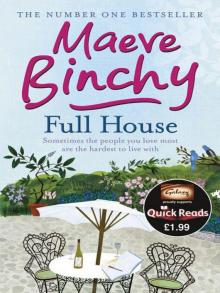 Victoria Line, Central Line
Victoria Line, Central Line Maeve's Times
Maeve's Times Evening Class
Evening Class Minding Frankie
Minding Frankie London Transports
London Transports The Lilac Bus
The Lilac Bus A Few of the Girls: Stories
A Few of the Girls: Stories A Week in Summer: A Short Story
A Week in Summer: A Short Story Full House
Full House Scarlet Feather
Scarlet Feather Dear Maeve
Dear Maeve Light a Penny Candle
Light a Penny Candle Tara Road
Tara Road Circle of Friends
Circle of Friends Maeve Binchy's Treasury
Maeve Binchy's Treasury The Return Journey
The Return Journey Heart and Soul
Heart and Soul Aches & Pains
Aches & Pains The Builders
The Builders Whitethorn Woods
Whitethorn Woods Echoes
Echoes Nights of Rain and Stars
Nights of Rain and Stars Silver Wedding
Silver Wedding Dublin 4
Dublin 4 A Few of the Girls
A Few of the Girls Sister Caravaggio
Sister Caravaggio Lilac Bus
Lilac Bus Binchy ( 2000 ) Scarlet Feather
Binchy ( 2000 ) Scarlet Feather